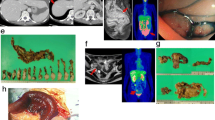Abstract
Distinguishing primary ovarian cancer from metastatic colorectal cancer is often difficult by a conventional pathological examination alone. We assessed the usefulness of p53 gene mutation analysis for the differential diagnosis of ovarian adenocarcinoma. A 66-year-old woman suffered multiple organ metastases, including the liver, para-aortic lymph node, and right ovary, following an operation for advanced sigmoid colon cancer. She underwent ovarian resection after effective chemotherapy against the liver and para-aortic lymph node cancer. Histological analysis suggested primary ovarian cancer. Therefore, we applied p53 gene mutation analysis for the differential diagnosis of primary versus metastatic ovarian cancer from sigmoid colon cancer. The direct sequence of the p53 gene demonstrated the same gene mutation in codon 211 (ACT to ATT) in both the sigmoid colon and ovarian cancers. According to the International Agency for Research on Cancer TP53 mutation database, this type of p53 mutation in colorectal cancer and ovarian cancer is 0.13% (5/3,693) and 0% (0/1,494), respectively. Therefore, we determined that the ovarian tumor was metastatic. Although p53 gene mutation analysis has been applied in some cases, this modality is very useful for the differential diagnosis of primary and metastatic cancer.




Similar content being viewed by others
References
Yada-Hashimoto N, Yamamoto T, Kamiura S et al (2003) Metastatic ovarian tumors: a review of 64 cases. Gynecol Oncol 89:314–317
Turan T, Aykan B, Koc S et al (2006) Analysis of metastatic ovarian tumors from extragenital primary sites. Tumori 92:491–495
Salamalekis E, Bakas P, Sykiotis K et al (2004) Outcome of patients with ovarian metastatic tumors. Report of 83 cases and review. Eur J Gynaecol Oncol 25:713–715
Hanna NN, Cohen AM (2004) Ovarian neoplasms in patients with colorectal cancer: understanding the role of prophylactic oophorectomy. Clin Colorectal Cancer 3:215–222
Huang PP, Weber TK, Mendoza C et al (1998) Long-term survival in patients with ovarian metastases from colorectal carcinoma. Ann Surg Oncol 5:695–698
Abu-Rustum N, Barakat RR, Curtin JP (1997) Ovarian and uterine disease in women with colorectal cancer. Obstet Gynecol 89:85–87
Grothey A, Sargent D, Goldberg RM et al (2004) Survival of patients with advanced colorectal cancer improves with the availability of fluorouracil-leucovorin, irinotecan, and oxaliplatin in the course of treatment. J Clin Oncol 22:1209–1214
Yemelyanova AV, Vang R, Judson K et al (2008) Distinction of primary and metastatic mucinous tumors involving the ovary: analysis of size and laterality data by primary site with reevaluation of an algorithm for tumor classification. Am J Surg Pathol 32:128–138
Cathro HP, Stoler MH (2002) Expression of cytokeratins 7 and 20 in ovarian neoplasia. Am J Clin Pathol 117:944–951
Park SY, Kim HS, Hong EK et al (2002) Expression of cytokeratins 7 and 20 in primary carcinomas of the stomach and colorectum and their value in the differential diagnosis of metastatic carcinomas to the ovary. Hum Pathol 33:1078–1085
Logani S, Oliva E, Arnell PM et al (2005) Use of novel immunohistochemical markers expressed in colonic adenocarcinoma to distinguish primary ovarian tumors from metastatic colorectal carcinoma. Mod Pathol 18:19–25
Vang R, Gown AM, Wu LS et al (2006) Immunohistochemical expression of CDX2 in primary ovarian mucinous tumors and metastatic mucinous carcinomas involving the ovary: comparison with CK20 and correlation with coordinate expression of CK7. Mod Pathol 19:1421–1428
Oda T, Tsuda H, Scarpa A et al (1992) Mutation pattern of the p53 gene as a diagnostic marker for multiple hepatocellular carcinoma. Cancer Res 52:3674–3678
Noguchi M, Maezawa N, Nakanishi Y et al (1993) Application of the p53 gene mutation pattern for differential diagnosis of primary versus metastatic lung carcinomas. Mol Pathol 2:29–35
Nakazato Y, Tanaka R, Seki E et al (2008) Differential diagnosis of primary versus metastatic pulmonary adenocarcinomas using gene mutation analyses: a case report. J Thorac Oncol 3:931–934
Mok CH, Tsao SW, Knapp RC et al (1992) Unifocal origin of advanced human epithelial ovarian cancers. Cancer Res 52:5119–5122
Russo A, Bazan V, Iacopetta B et al (2005) The TP53 colorectal cancer international collaborative study on the prognostic and predictive significance of p53 mutation: influence of tumor site, type of mutation, and adjuvant treatment. J Clin Oncol 23:7518–7528
Khan ZA, Jonas SK, Le-Marer N et al (2000) P53 mutations in primary and metastatic tumors and circulating tumor cells from colorectal carcinoma patients. Clin Cancer Res 6:3499–3504
Albanese I, Scibetta AG, Migliavacca M et al (2004) Heterogeneity within and between primary colorectal carcinomas and matched metastases as revealed by analysis of Ki-ras and p53 mutations. Biochem Biophys Res Commun 325:784–791
Conflict of interest statement
No author has any conflict of interest.
Author information
Authors and Affiliations
Corresponding author
About this article
Cite this article
Yamano, T., Morii, E., Arai, I. et al. Diagnosis of primary versus metastatic ovarian adenocarcinoma using p53 gene mutation analysis. Int J Clin Oncol 15, 621–625 (2010). https://doi.org/10.1007/s10147-010-0096-z
Received:
Accepted:
Published:
Issue Date:
DOI: https://doi.org/10.1007/s10147-010-0096-z




